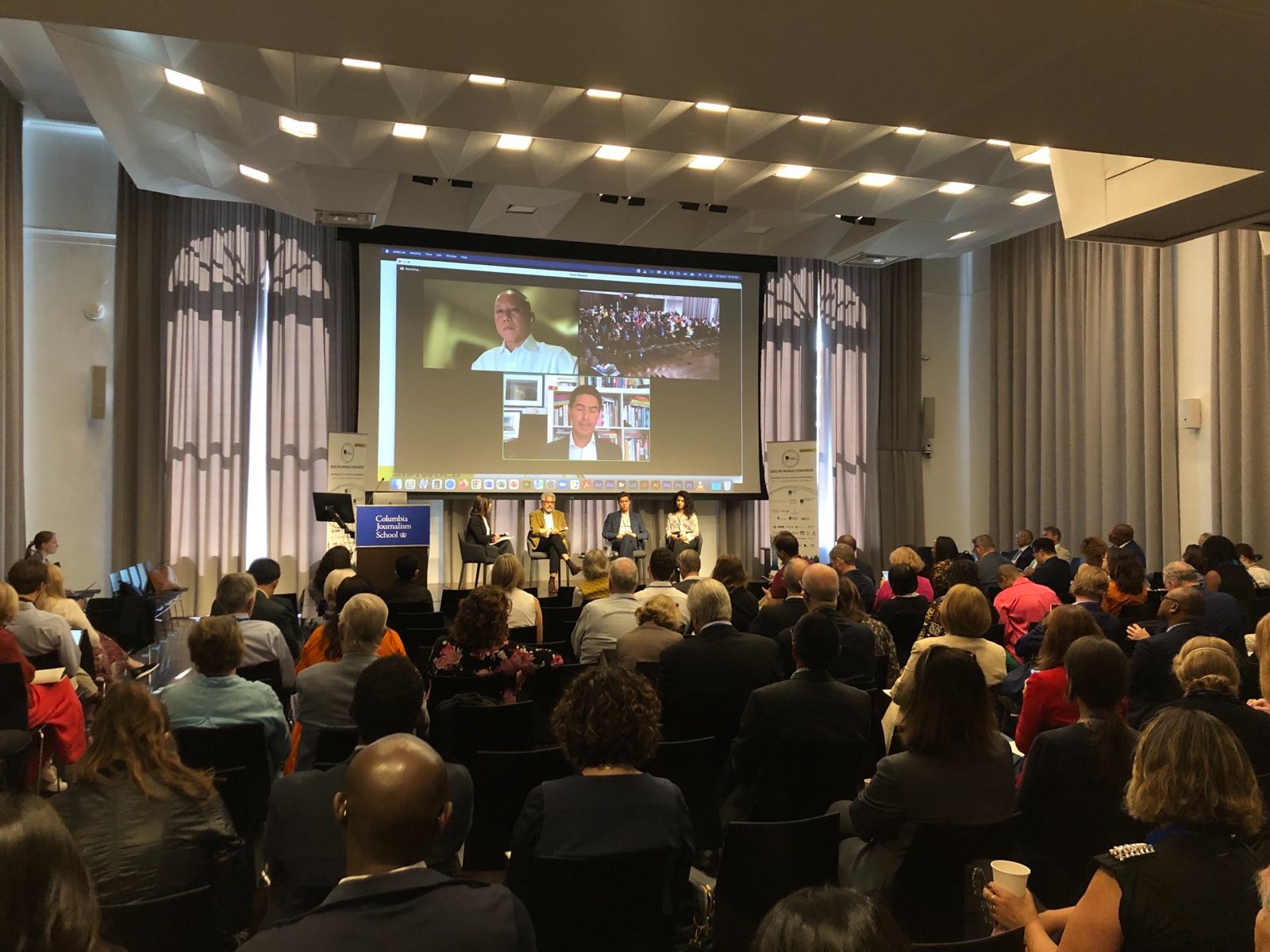During Day 2 of IPI’s World Congress at Columbia University in New York City, panelists from India, Myanmar, Russia, Pakistan and Central America talked about what it’s like to have front-row seats to the deterioration of press freedom.
A changed media landscape, a lack of local independent media, disappearing sources, and the weaponization of disinformation are some of the key issues facing journalists on the press freedom frontline according to panelists from India, Myanmar, Russia, Pakistan and Central America, speaking during day 2 of the IPI 2022 World Congress. The conversation was moderated by Julie Pace, senior vice president and executive editor of the Associated Press.
“The entire region of Central America is going backwards in regards to press freedom”, said José Zamora, chief communications and impact officer of EXILE and the son of José Rubén Zamora, a Guatemalan journalist and IPI World Press Freedom Hero who has been jailed since the end of July. According to Zamora, the Guatemalan government has become increasingly oppressive and authoritarian with the plight of his father, who faces money laundering charges among others, being just one example.
“The authoritarian repression handbook now has found a new trick which is that all of the journalists in the region are money launderers”, said Zamora, who joined the panel online.
The tricks of authoritarian regimes are nothing new to the other panelists either, with Roman Anin, founder and editor-in-chief of IStories, a Russian investigative media outlet operating in exile in Latvia, stating that “with the recent censorship laws, there’s no independent media left in Russia”.
Sonny Swe, CEO and founder of Frontier Myanmar, described how the whole media landscape of Myanmar has changed since the military coup in February 2021.
“There are three types of media outlets operating in Myanmar. One is military-backed, the second is underground media outlets and third is exile media. I’m one of the relocated outlets”, said Swe. He added that underground and relocated journalists still face multiple security challenges. Swe said that many journalists are struggling to survive.
“Please help, for their security and their future. I have never seen a media landscape like that in my life”, Swe said, addressing the Congress.
The lack of local independent media was also noted by Ayesha Tanzeem, director of the South and Central Asia Division of the Voice of America, who has reported on the ground from Afghanistan.
“When I talk to Afghan journalists today, there’s not a single one who’s not self-censoring”, said Tanzeem. She added that there have been differences in the media coverage of parts of the country, with “news black holes” being born due to having no one to report from certain provinces.
So how do we get information from an area if there’s no local free media and foreign journalists cannot access it?
“One of the things we do now is to have someone on the ground helping us without giving them the byline or mentioning their name”, said Tanzeem. She has also been using old sources, gathered from her previous reporting missions in the country.
“Our biggest source at the moment are locals. We used to go knock on people’s doors, now we’re just calling them. However, more and more people we call are leaving the country or planning on leaving.”
Roman Anin from IStories joined in, describing how after Russia began its war in Ukraine he couldn’t talk to his sources in the secret service anymore, with many if not all of them being supportive of the war. “It is difficult to get information on Russia”, said Anin. When working with freelancers, he also had to take extreme caution.
“We do a lot of video, which is challenging because we have to get it from the ground. If a freelancer is stopped by police and the police finds out they’re working for us, the freelancer could end up in jail”, said Anin.
The panelists also touched upon the topic of disinformation and professional “fake news”. Siddharth Varadarajan, founding editor of The Wire in India, stated that the government has weaponized disinformation and surveillance. José Zamora said Central America was seeing a similar experience.
“The governments have newsrooms, teams of organized trolls attacking anyone critical of the authorities. This happens in every country in Central America”, said Zamora.
Swe agreed, saying that, with regards to spreading disinformation, the Myanmar junta is copy-pasting from other governments. Tanzeem from VOA added that the audiences seem to be genuinely confused about what is real and what is fake when it comes to the news.
“This is a bigger problem. We have to ask ourselves, why do we have a society full of educated people without any critical thinking skills?”, said Tanzeem.
Varadarajan noted that disinformation has been with us forever, but it’s technology that makes things worse. “Good journalism is the only way we can fight the spread of fake news”, he said.
